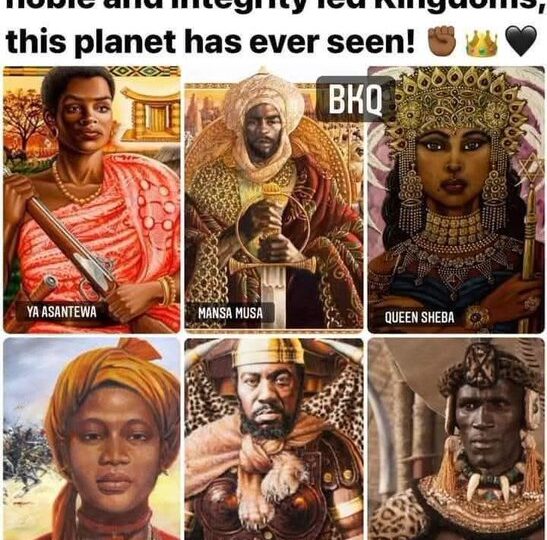Africa’s history is a tapestry of mighty empires that shaped the continent and influenced the world. From the gold-rich Mali Empire to the architectural marvels of Great Zimbabwe, African kingdoms demonstrated innovation, wealth, and cultural sophistication long before European colonization.
Yaa Asantewaa: The Fearless Warrior Queen of the Ashanti
Yaa Asantewaa, often celebrated as a symbol of resistance, was a queen mother of the Ashanti Empire in present-day Ghana. Born in the mid-1800s, she rose to prominence during a time of colonial oppression. In 1900, when the British demanded the Golden Stool—the sacred symbol of Ashanti unity—and exiled the Ashanti king, Yaa Asantewaa refused to bow to their demands. At the age of 70, she rallied her people with a powerful call to action: “If you, the men of Asante, will not go forward, then we will.” Her words ignited the Yaa Asantewaa War of Independence, also known as the War of the Golden Stool, a fierce rebellion against British rule.
Though the Ashanti ultimately lost the war, and Yaa Asantewaa was exiled to the Seychelles, where she died in 1921, her legacy endures. She remains a powerful emblem of courage, leadership, and the fight for sovereignty, inspiring generations to stand against injustice.
Mansa Musa: The Golden King of Mali
Mansa Musa, the ninth ruler of the Mali Empire, reigned from 1312 to 1337 and is often regarded as one of the wealthiest individuals in history. Under his leadership, the Mali Empire reached its zenith, stretching across West Africa and controlling key trade routes for gold and salt. Mansa Musa’s most famous act was his pilgrimage to Mecca in 1324, during which he distributed so much gold that it reportedly caused inflation in Cairo.
Beyond his wealth, Mansa Musa was a patron of education and culture. He transformed the city of Timbuktu into a global center of learning, attracting scholars, poets, and architects. His reign exemplified integrity through his commitment to justice and the promotion of Islamic scholarship, leaving a legacy that continues to captivate historians and economists alike.
Queen Sheba: The Enigmatic Ruler of Legend
Queen Sheba, often associated with the ancient kingdom of Saba (modern-day Yemen and Ethiopia), is a figure of both history and myth. She is best known for her visit to King Solomon of Israel, as described in the Bible and the Quran, where she tested his wisdom with riddles and gifted him with gold, spices, and precious stones. In Ethiopian tradition, she is known as Makeda, the mother of Menelik I, the founder of the Solomonic dynasty.
While some debate her African origins—pointing to her likely base in the Arabian Peninsula—her story is deeply intertwined with the Horn of Africa, particularly through Ethiopia’s Kebra Nagast, a sacred text that celebrates her as a wise and powerful queen. Her inclusion in the tweet underscores the interconnectedness of African and Middle Eastern histories.
Queen Amina: The Warrior Queen of Zazzau
Queen Amina of Zazzau (modern-day northern Nigeria) ruled in the 16th century and is celebrated as one of Africa’s greatest military strategists. Known as the “Warrior Queen,” Amina expanded her kingdom’s territory through a series of conquests, leading an army of 20,000 soldiers. She is credited with fortifying Zazzau’s cities with defensive walls, many of which still stand today, and boosting the region’s economy through trade and agriculture.
Amina’s legacy is a testament to the power of women in African leadership. Her story challenges traditional gender roles, showing that women could lead armies and govern empires with the same authority as men.
Hannibal of Carthage: The Military Genius
Hannibal Barca, a Carthaginian general from the 3rd century BCE, is one of history’s most renowned military strategists. Carthage, located in modern-day Tunisia, was a Phoenician city-state that became a dominant power in the western Mediterranean. Hannibal is best known for his daring campaign against Rome during the Second Punic War, particularly his crossing of the Alps with war elephants to launch a surprise attack.
The tweet’s inclusion of Hannibal has sparked debate, with some users pointing out that Carthage was a Phoenician (Semitic) civilization, not a Sub-Saharan African one. While this is true—Carthage’s origins trace back to the Levant—North Africa’s cultural and genetic diversity means that Hannibal’s identity cannot be reduced to a single ethnicity. His story is a reminder of the complex interactions between African, Mediterranean, and Middle Eastern cultures.
Shaka Zulu: The Revolutionary Leader of the Zulu Kingdom
Shaka Zulu, who ruled the Zulu Kingdom in the early 19th century, transformed a small chiefdom into a formidable empire in southern Africa. Known for his military innovations, such as the use of the short stabbing spear (iklwa) and the “buffalo horns” formation, Shaka revolutionized warfare in the region. Under his leadership, the Zulu Kingdom expanded rapidly, dominating much of present-day South Africa.
However, Shaka’s legacy is complex. While he is celebrated as a unifying leader, some replies to the tweet highlight his ruthless tactics and the violence that accompanied his conquests. Shaka’s story raises important questions about the nature of power and leadership, showing how greatness can be both inspiring and controversial.
The Kingdoms Behind the Leaders
The leaders highlighted in the tweet were products of some of Africa’s most influential kingdoms:
- The Mali Empire: At its height in the 14th century, the Mali Empire was a center of wealth, culture, and Islamic scholarship. Mansa Musa’s reign symbolized its golden age.
- The Ashanti Empire: Known for its military prowess and cultural richness, the Ashanti Empire thrived in West Africa, with leaders like Yaa Asantewaa embodying its spirit of resistance.
- The Kingdom of Zazzau: A Hausa city-state in northern Nigeria, Zazzau flourished under Queen Amina’s rule, becoming a hub of trade and military power.
- The Kingdom of Aksum: Located in the Horn of Africa, Aksum was a major trading empire that influenced both Africa and the Middle East. It is often linked to Queen Sheba’s legacy.
- Carthage: A Phoenician city-state in North Africa, Carthage was a maritime power that challenged Rome, with Hannibal as its most famous general.
- The Zulu Kingdom: Under Shaka’s leadership, the Zulu Kingdom became a dominant force in southern Africa, leaving a lasting cultural and political legacy.
Addressing the Debates: Historical Accuracy and Representation
Some will challenge the “noble and integrity” label, due to the fact that leaders like Shaka Zulu and Mansa Musa were involved in practices such as slavery, a common feature of many pre-modern societies.
These critiques highlight the complexity of African history. The continent’s cultural diversity means that its kingdoms and leaders cannot be neatly categorized. North African civilizations like Carthage were deeply connected to the Mediterranean world, while Sub-Saharan empires like Mali and Zulu had their own distinct traditions.
Despite these debates, the article serves an important purpose: it brings attention to Africa’s often-overlooked contributions to global history. By celebrating figures like Yaa Asantewaa and Mansa Musa, it challenges Eurocentric narratives and encourages a deeper appreciation of the continent’s past.
Why Africa’s Kingdoms Still Matter Today
The legacies of these kingdoms and their leaders continue to resonate in the modern world. The Mali Empire’s emphasis on education and scholarship, for example, reminds us of the importance of knowledge in building prosperous societies. Yaa Asantewaa’s resistance against colonialism inspires contemporary movements for justice and self-determination. Shaka Zulu’s military innovations highlight the ingenuity of African societies, often ignored in mainstream historical accounts.
Moreover, these stories remind us of the diversity and interconnectedness of African cultures. From the gold trade of West Africa to the maritime power of Carthage, African kingdoms were not isolated—they engaged with the world, shaping global history in profound ways.
Honoring Africa’s Noble Legacy
This article is a call to recognize and celebrate the noble and integrity-led kingdoms that have defined Africa’s history. From the fearless leadership of Yaa Asantewaa to the unparalleled wealth of Mansa Musa, these figures embody the continent’s rich heritage. While debates about historical accuracy and representation are valid, they should not overshadow the broader message: Africa’s past is a source of pride and inspiration.
As we reflect on these kingdoms, let’s continue to explore and share their stories, ensuring that future generations understand the true depth of Africa’s contributions to the world. Whether through social media posts, academic research, or cultural celebrations, the legacy of Africa’s noble kingdoms deserves to be remembered and honored.

